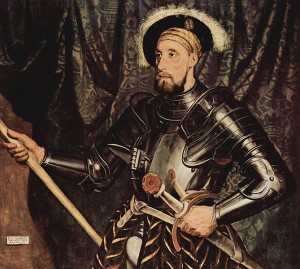 St George’s day, 23 April 1536, brought the first outward sign that the Boleyns were losing their influence. George was expected to receive the Order of the Garter, the pinnacle honour of the realm, and his sister strongly supported him. George had been nominated the previous year and had received a reasonable amount of support, but James V of Scotland had beaten him by two votes.1
St George’s day, 23 April 1536, brought the first outward sign that the Boleyns were losing their influence. George was expected to receive the Order of the Garter, the pinnacle honour of the realm, and his sister strongly supported him. George had been nominated the previous year and had received a reasonable amount of support, but James V of Scotland had beaten him by two votes.1
Despite Anne’s championing of George, much to the delight of Chapuys the honour in 1536 actually went to Sir Nicholas Carew, a known opponent of the Boleyns and the man who was coaching Jane Seymour.2 Carew beat George soundly, receiving twice as many votes, and even Thomas Boleyn had voted for him.3
The choice was at least in part dictated by the King’s earlier promise to Francis I that Carew was next in line.4 In truth, if Henry had wished for George to be awarded the honour then no previous promise made to the King of France would have prevented him granting it; furthermore, if the King had always intended to honour his promise to the King of France why did he allow George’s name to be put forward in the first place? Henry must have known that by allowing George’s name to be put forward, and then awarding the position to an opponent of the Boleyns, he would bring public humiliation to his brother-in-law. George was forced to swallow his very public slight, and hold his head high as the court digested the implications of the King’s choice. Up until now, George had been the golden boy, and he was completely unused to personal failure and rejection. The King’s decision must have hit him hard. Yet neither Anne nor George could possibly have foreseen the manner of their eventual downfall.5
Nicholas Carew was a royal favourite until his arrest on 31st December 1538. He was implicated in a plot to depose Henry VIII and to replace him with Henry Courtenay, 1st Marquess of Exeter and cousin of the King through his mother Catherine of York. Carew was tried on 14th February 1539 and executed on 8th March on Tower Hill.
Notes and Sources
- The Register of the Most Noble Order of the Garter (The Black Book), 394–395.
- LP x. 715, 752
- The Register of the Most Noble Order of the Garter (The Black Book), 399-401
- LP vi. 555, LP viii. 174: “Presented the letter in favor of the “Grand Escuyer” of England [Carew], to which he replied that the said place of the Chancellor of the Order was filled by the king of Scotland, and the number of 24 could not be excceded. On the first vacancy he would remember the said Grand Escuyer.”, Palamedes Gontier to Admiral Chabot.
- Part of this article is taken from George Boleyn: Tudor Poet, Courtier and Diplomat by Clare Cherry and Claire Ridgway, which is due for release very soon.